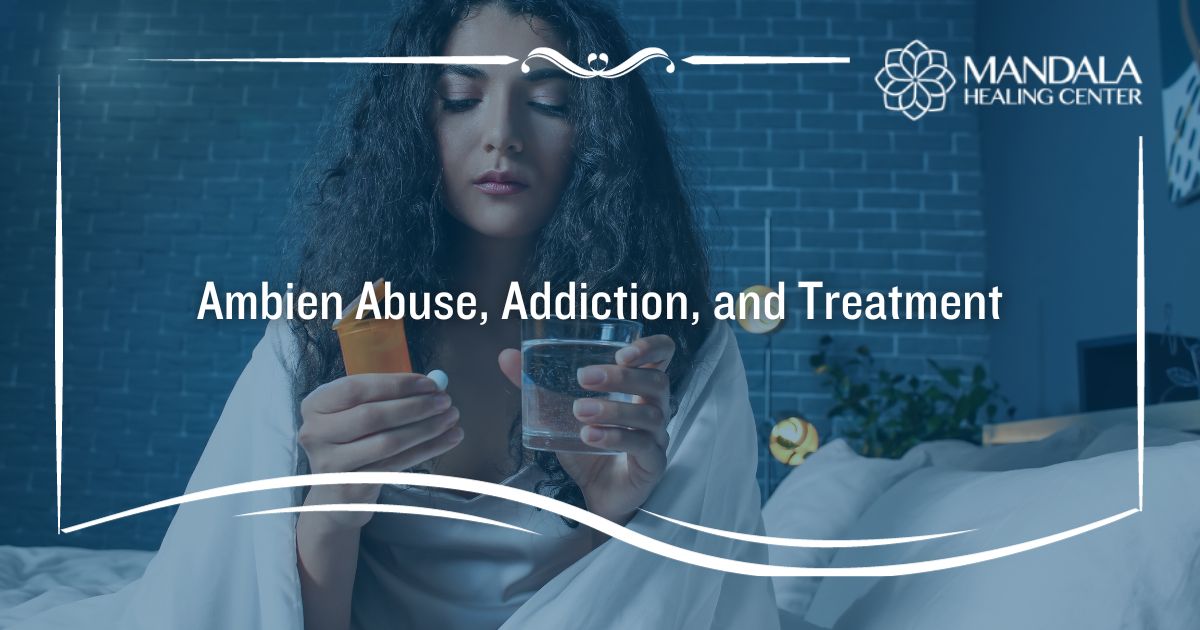Some people believe that all prescription medications are safe to use in any circumstance, but this is not the case. While prescription drugs can be safe to use under careful medical guidance, many have the potential for abuse and addiction, as well as other risks.
Ambien is a commonly prescribed sedative drug doctors prescribe to treat insomnia. Ambien works by slowing activity in the central nervous system and increasing inhibitory brain activity, which can help people fall asleep.
When Ambien was first developed, it was promoted as a safer alternative to benzodiazepines, which have a high risk for dependence and addiction. However, recent research shows that the risk for Ambien abuse and addiction is much greater than previously thought. People who take Ambien for long periods are at risk of addiction and other complications.
It’s important to understand the risks of Ambien abuse and addiction and seek treatment if you need help to stop taking it. Reach out to the caring specialists at the Mandala Healing Center now to learn about our holistic substance use disorder treatment programs or to be connected to support at any stage of your recovery journey.
The Effects and Risks of Ambien
All medications have the potential for side effects and carry some risk. Ambien is a medication people take to relieve insomnia and stay asleep. While people may be able to use it without complications, the potential for addiction and other unwanted effects is possible.
Effects of Ambien
Ambien is a sedative-hypnotic that can induce sleep. Its primary effects are drowsiness and sedation.
However, some users may experience unwanted side effects when using Ambien, including:
- Headache
- Nausea
- Vomiting
- Drowsiness during the day
- Diarrhea
- Dizziness
- Loss of coordination
- Feeling groggy or sluggish during the day
Some people who take Ambien may experience more severe side effects, including:
- Depression
- Suicidal ideation
- Behavioral changes
- Aggression
- Anxiety
- Nightmares
- Delayed reactions
People who take Ambien for long periods are more likely to experience unwanted side effects and lingering complications, but anyone taking it can develop them.
Risks of Ambien
One of the most significant risks of Ambien is complex sleep behaviors. Some people who take Ambien may perform complex behaviors while asleep, such as cooking, driving, and sleepwalking. People are unaware of these behaviors and are not in control over their actions, which puts them and others at risk for car accidents, fires, drowning, and more.
Suicidal thoughts and behaviors are another significant risks for Ambien users. People who take Ambien may have an increased risk for depression and suicidal thoughts and may act on these thoughts without professional intervention.
Recognizing Ambien Abuse and Addiction
Some Ambien users do not experience sedation when taking this medication. Instead, they experience euphoria, which can make them want to use the drug differently than prescribed. People may abuse Ambien by taking larger or more frequent doses of the drug than prescribed or by taking it recreationally–meaning without a prescription.
Ambien abuse can lead to short and long-term harm to a person’s mental and physical health. It’s essential to recognize the signs of Ambien abuse and addiction and seek treatment as soon as possible.
Signs of Ambien Abuse and Addiction
Recognizing the signs of Ambien abuse and addiction can be difficult because it is a prescription medication. But substance abuse and addiction change how a person thinks, feels, and behaves. Noticing these changes can help you or a loved one get treatment quickly.
Some of the signs of Ambien abuse and addiction include:
- Using Ambien recreationally
- Buying Ambien illegally
- Sleeping so much that it disrupts your life or keeps you from taking care of your responsibilities
- Using Ambien differently than your doctor prescribed–taking larger doses or taking it more often than you should
- Using Ambien every night
- Forging prescriptions or having multiple prescriptions with several different doctors
- Driving after taking Ambien
- Mixing Ambien and other substances
- Experiencing withdrawal symptoms if you stop using it
Exhibiting these signs of Ambien abuse may mean that you need professional treatment to safely stop using the medication and to avoid relapse.
Treatment for Ambien Abuse and Addiction
Ambien abuse can lead to physical dependence. When someone stops taking it, they may experience intense withdrawal symptoms that make them want to start using it again. Symptoms may include:
- Agitation
- Panic attacks
- Disorientation
- Hallucinations
- Nausea and vomiting
- Sweating
- Delirium
- Increased blood pressure, heart rate, and body temperature
- Stomach cramps
- Tremors
- Seizures
People with Ambien addiction require treatment during detoxification that allows them to have a safe, complete detox. For many with Ambien addiction, a medically supervised detox program is the first stage of recovery.
After detox, people with Ambien abuse must participate in a comprehensive treatment plan that can help them identify and heal the complex roots of their addiction. Substance use disorder treatment plans typically include:
- Individual, group, and family therapy
- Medications
- Mental health and medical treatment
- Relapse prevention education
- Holistic therapies like massage, yoga, nutrition support, and art therapy
During treatment, people will develop an aftercare plan to keep them active and engaged in recovery after leaving rehab. An aftercare plan may include regular therapy and medical care, 12-step meetings, sober living, and other activities that support lifelong addiction recovery.
Find Ambien Abuse Treatment Now
If you or someone you love needs substance use disorder treatment, you are not alone. Reach out to the compassionate addiction specialists at the Mandala Healing Center now to learn about our holistic programs or schedule an intake assessment.












